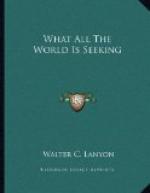moreover, become continually harder for you to refrain
from it, until resentment, anger, and possibly even
hatred and revenge become characteristics of your
nature, robbing it of its sunniness, its charm, and
its brightness for all with whom you come in contact.
If, however, the instant the impulse to resentment
and anger arises, you check it
then and there,
and throw the mind on to some other object of thought,
the power will gradually grow itself of doing this
same thing more readily, more easily, as succeeding
like causes present themselves, until by and by the
time will come when there will be scarcely anything
that can irritate you, and nothing that can impel you
to anger; until by and by a matchless brightness and
charm of nature and disposition will become habitually
yours, a brightness and charm you would scarcely think
possible to-day. And so we might take up case
after case, characteristic after characteristic, habit
after habit. The habit of fault-finding and its
opposite are grown in identically the same way; the
characteristic of jealousy and its opposite; the characteristic
of fear and its opposite. In this same way we
grow either love or hatred; in this way we come to
take a gloomy, pessimistic view of life, which objectifies
itself in a nature, a disposition of this type, or
we grow that sunny, hopeful, cheerful, buoyant nature
that brings with it so much joy and beauty and power
for ourselves, as well as so much hope and inspiration
and joy for all the world.
There is nothing more true in connection with human
life than that we grow into the likeness of those
things we contemplate. Literally and scientifically
and necessarily true is it that, “as a man thinketh
in his heart, so is he.” The “is”
part is his character. His character is the sum
total of his habits. His habits have been formed
by his conscious acts; but every conscious act is,
as we have found, preceded by a thought. And
so we have it—thought on the one hand, character,
life, destiny on the other. And simple it becomes
when we bear in mind that it is simply the thought
of the present moment, and the next moment when it
is upon us, and then the next, and so on through all
time.
One can in this way attain to whatever ideals he would
attain to. Two steps are necessary: first,
as the days pass, to form one’s ideals; and
second, to follow them continually whatever may arise,
wherever they may lead him. Always remember that
the great and strong character is the one who is ever
ready to sacrifice the present pleasure for the future
good. He who will thus follow his highest ideals
as they present themselves to him day after day, year
after year, will find that as Dante, following his
beloved from world to world, finally found her at the
gates of Paradise, so he will find himself eventually
at the same gates. Life is not, we may say, for
mere passing pleasure, but for the highest unfoldment
that one can attain to, the noblest character that




